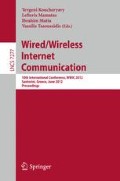Abstract
We investigate the problem of routing in opportunistic networks and propose a novel routing algorithm, which combines probabilistic routing with erasure coding. Erasure coding generates large amounts of code blocks with fixed overhead; we apply a sophisticated but realistic method to allocate the generated code blocks to nodes that relies on a probabilistic metric for evaluating node potential. Our goal is to enhance further the robustness of the erasure-coding based forwarding in worst-case delays but also in small-delay scenarios. We detail our algorithm and evaluate its performance against other well-known routing algorithms. We exploit scenarios with adequate resource storage as well as scenarios with limited storage capacity. In both cases, our algorithm yields promising results.
Access this chapter
Tax calculation will be finalised at checkout
Purchases are for personal use only
Preview
Unable to display preview. Download preview PDF.
References
Delay tolerant networking research group, http://www.dtnrg.org
Wang, Y., Wu, H.: Dft-msn: The delay fault tolerant mobile sensor network for pervasive information gathering. In: IEEE Infocom (2006)
Heidemann, J., Ye, W., Wills, J., Syed, A., Li, Y.: Research challenges and applications for underwater sensor networking. In: Proceedings of IEEE WCNC (2006)
Hui, P., Chaintreau, A., Scott, J., Gass, R., Crowcroft, J., Diot, C.: Pocket switched networks and human mobility in conference environments. In: WDTN 2005: Proceeding of the 2005 ACM SIGCOMM Workshop on Delay-Tolerant Networking (2005)
LeBrun, J., Chuah, C., Ghosal, D., Zhang, M.: Knowledge-based opportunistic forwarding in vehicular wireless ad hoc networks. In: Proceedings of the Vehicular Technology Conference, vol. 4, pp. 2289–2293 (2005)
Vahdat, A., Becker, D.: Epidemic Routing for Partially-connected Ad hoc Networks. Technical Report CS-2000-06, Duke University (2000)
Burgess, J., Gallagher, B., Jensen, D., Levine, B.N.: MaxProp: Routing for Vehicle-Based Disruption-Tolerant Networks. In: Proceedings of IEEE Infocom, pp. 1–11 (April 2006)
Tseng, Y.-C., Ni, S.-Y., Chen, Y.-S., Sheu, J.-P.: The broadcast storm problem in a mobile ad hoc network. Wireless Networks 8(2/3), 153–167 (2002)
Chen, X., Murphy, A.L.: Enabling disconnected transitive communication in mobile ad hoc networks. In: Proceedings of Workshop on Principles of Mobile Computing, Colocated with PODC 2001 (August 2001)
Lindgren, A., Doria, A., Schelen, O.: Probabilistic routing in intermittently connected networks. SIGMOBILE Mobile Comput. Commun. Rev. 7(3) (2003)
Spyropoulos, T., Psounis, K., Raghavendra, C.: Spray and wait: an efficient routing scheme for intermittently connected mobile networks. In: WDTN 2005: Proceeding of the 2005 ACM SIGCOMM Workshop on Delay-Tolerant Networking, pp. 252–259. ACM Press, New York (2005)
Wang, Y., Jain, S., Martonosi, M., Fall, K.: Erasure-coding based routing for opportunistic networks. In: WDTN 2005: Proceeding of the 2005 ACM SIGCOMM Workshop on Delay-Tolerant Networking, pp. 229–236. ACM Press, New York (2005)
Chen, L.-J., Yu, C.-H., Sun, T., Chen, Y.-C., Chu, H.H.: A Hybrid Routing Approach for Opportunistic Networks. In: CNANTS 2006: Proceedings of the 2006 SIGCOMM Workshop on Challenged Networks (2006)
Jain, S., Demmer, M., Patra, R., Fall, K.: Using Redundancy to Cope with Failures in a Delay Tolerant Network. In: ACM SIGCOMM Workshop on Delay Tolerant Networks (2005)
Liao, Y., Tan, K., Zhang, Z., Gao, L.: Estimation based Erasure-Coding Routing in Delay Tolerant Networks. In: IWCMC 2006: Proceedings of the 2006 International Conference on Wireless Communications and Mobile Computing (2006)
Keranen, A., Ott, J., Karkkainen, T.: The ONE simulator for DTN protocol evaluation. In: Simutools 2009: Proceedings of the 2nd International Conference on Simulation Tools and Techniques (2009)
Author information
Authors and Affiliations
Editor information
Editors and Affiliations
Rights and permissions
Copyright information
© 2012 Springer-Verlag Berlin Heidelberg
About this paper
Cite this paper
Tsapeli, F., Tsaoussidis, V. (2012). Routing for Opportunistic Networks Based on Probabilistic Erasure Coding. In: Koucheryavy, Y., Mamatas, L., Matta, I., Tsaoussidis, V. (eds) Wired/Wireless Internet Communication. WWIC 2012. Lecture Notes in Computer Science, vol 7277. Springer, Berlin, Heidelberg. https://doi.org/10.1007/978-3-642-30630-3_22
Download citation
DOI: https://doi.org/10.1007/978-3-642-30630-3_22
Publisher Name: Springer, Berlin, Heidelberg
Print ISBN: 978-3-642-30629-7
Online ISBN: 978-3-642-30630-3
eBook Packages: Computer ScienceComputer Science (R0)

